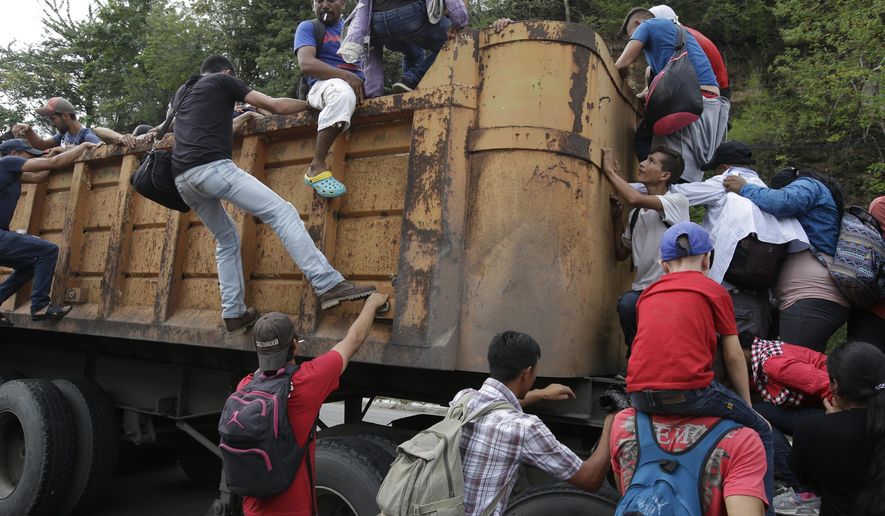Mexico has asked the United Nations for assistance with the migrant caravan knocking on its border, saying international officials must help figure out who deserves asylum and who should be deported or refused entry.
Hundreds of Mexican police faced off Thursday across the Mexico-Guatemala border against the vanguard of the caravan, which has grown to some 4,000 people, mostly from Honduras. Some migrants reportedly made it to shelters in Mexico.
Mexican officials were desperately trying to block the migrants after President Trump threatened Thursday to cancel his proposed U.S.-Mexico-Canada trade deal as punishment for Mexico’s failure to patrol its southern border.
He said another option would be to deploy the U.S. military.
“The assault on our country at our Southern Border, including the criminal elements and DRUGS pouring in, is far more important to me, as president, than trade or the USMCA,” he tweeted. “Hopefully Mexico will stop this onslaught.”
That demand put Mexico between an unstoppable force — the migrants, who are backed by human rights activists — and an immovable object: Mr. Trump.
SEE ALSO: Democrats behind migrant caravan, Donald Trump suggests
The plea to the U.N. appeared to be a solution.
Mexican Foreign Affairs Secretary Luis Videgaray went to New York to make his request personally for the U.N. High Commissioner for Refugees to get involved.
While the exact role the U.N. would play would have to be worked out, it appears Mexico is seeking the international body’s help in creating a processing center to evaluate the migrants and identify which ones should qualify as refugees worthy of protection, and which are more properly viewed as traditional illegal immigrants.
“Any person wishing to enter national territory must do so by complying with the requirements established in the Migration Law and at the authorized entry points, and may then move freely in Mexico until the expiration of the visa,” the Foreign Affairs Ministry said in a statement.
The ministry added: “Current legislation does not permit entry into Mexico if requirements to travel to a neighboring country have not been met.”
That seems to suggest the government is seeking ways to accommodate Mr. Trump’s demand for action.
The State Department praised the Mexican government’s announcement and pledged American cooperation.
The caravan started with several hundred people in San Pedro Sula, a notoriously violent city in Honduras’ northwest.
As word of mouth and press coverage spread, others joined up, figuring there was strength in numbers. Now, as many as 4,000 men, women and children are streaming across Guatemala and hoping to traverse Mexico to reach the U.S.
Another caravan of more than 400 people also reportedly left Honduras to enter El Salvador this week.
Immigrant rights activists have said the people must be treated as refugees deserving of protections, entitled to enter the U.S. and make claims of asylum.
U.S. security analysts, pointing to history, say most of them are not refugees but are looking for jobs or to reunify with family in the U.S. illegally.
Still, U.S. law gives them a chance to claim asylum. Because of court decisions and a lack of resources, the government releases asylum-seekers while their claims are pending. At that point, most of them disappear into the shadows.
Of the tens of thousands of illegal immigrant children and families caught jumping the U.S. border in 2017, more than 98 percent remain in the country, said the Department of Homeland Security.
The Honduran government this week pleaded for the caravan to disperse, saying political rabble-rousers were using it to try to embarrass the U.S. and Central American governments.
That plea was made after Mr. Trump threatened to withhold tens of millions of dollars in U.S. assistance from countries that didn’t attempt to stop the migrants.
Mr. Trump on Thursday also blamed Democrats, saying they were cheering on the caravan “because they want open borders.”
“Can you believe this and what Democrats are allowing to be done to our country?” the president tweeted.
Those comments resonated back into Central America, where newspapers viewed the president’s get-tough talk as a symptom of the looming U.S. congressional elections.
Several papers said Mr. Trump was using immigration as a political tool to try to limit losses for his Republican Party.
Mexico, meanwhile, is in the middle of a political transformation with President Enrique Pena Nieto leaving office at the end of this year and Andres Manuel Lopez Obrador taking his place.
According to Mexican press accounts, Mr. Lopez Obrador said he has asked a top aide to talk with Secretary of State Mike Pompeo on Friday to try to get on the same page and is determined to have a “friendly” relationship with Mr. Trump.
He also said Mexico must look for solutions to give the migrants a chance at jobs and housing.
Mr. Pompeo is scheduled to be in Mexico City on Friday.
A caravan this spring also made its way through Mexico, challenging both U.S. and Mexican officials.
With Mr. Trump making threats, Mexico sought to cut the caravan’s size by offering asylum to hundreds of the migrants. Hundreds of others, however, were determined to try to enter the U.S.
• Stephen Dinan can be reached at sdinan@washingtontimes.com.




Please read our comment policy before commenting.